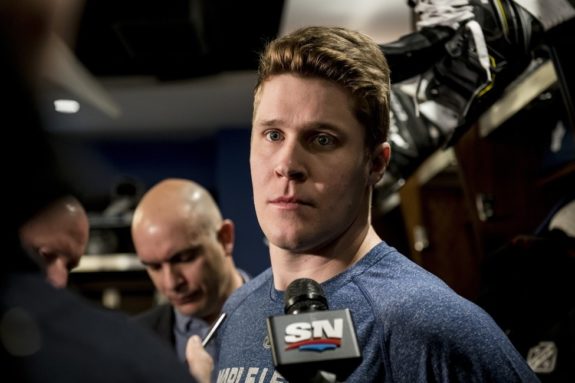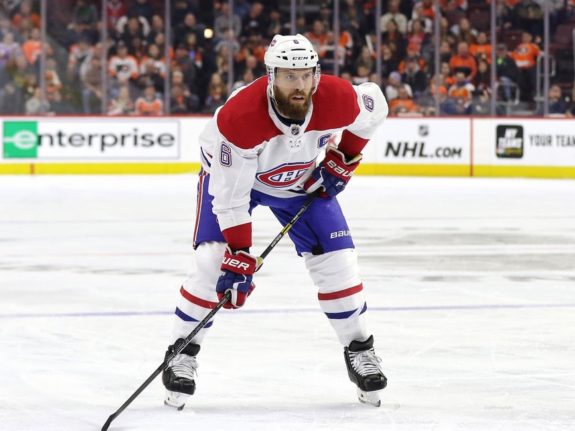Jake Gardiner reportedly turned down a three-year contract with a $5.25 million average annual value from the Montreal Canadiens, but that’s not a bad thing.

With an average production of 41 points and an average ice time of 21 minutes over the last three seasons, the Canadiens could definitely use a fast, puck-moving defenceman like Gardiner to bolster their top four. What they don’t need is a defenceman who struggles with decision-making and is unreliable in his own end. These are the tendencies of Gardiner.
Nowhere for Him to Play
Gardiner is known as an offensive defenceman. He has a stellar ability to read a developing offensive play and move the puck to where it needs to be. His 33 power play points over the past three seasons would have been a welcome upgrade to the Canadiens’ dismal man advantage, but he needs a defensively responsible partner for even strength.
This was a luxury he never had with the Toronto Maple Leafs. Nikita Zaitsev was never the answer, and even when paired with another puck-moving defenceman in Travis Dermott on Toronto’s third pair, Gardiner still had issues in his own end.
Seeing as Gardiner would have automatically become the Canadiens’ best option on the left side, the obvious conclusion would have been to pair Gardiner with Shea Weber on the top pairing. But Gardiner has only played one season against top competition, in 2015-16, so he isn’t used to the minutes that Weber gets.

Despite Weber’s stay-at-home tendencies, he is still of an offensive mind because of his massive point shot and his spot on the top power play unit. Weber is also slower than Gardiner, which would mean Gardiner would have been responsible for getting back and stopping the rush, which is a weakness of his. Both have also struggled with injuries recently, which wouldn’t have made this pairing a great option for coach Claude Julien.
Jeff Petry would have been the next partner candidate, which would have put Gardiner on the second pairing. This is optimal for him as he is used to playing second pairing minutes.
However, Petry would have had to alter his game drastically to adjust to Gardiner’s aggressive style, and he would also have likely been removed from the second power play, the unit Petry quarterbacked for most of last season. Coming off back-to-back 40-plus point seasons, a more conservative Petry is not what the Canadiens need.
Finally, playing Gardiner any lower in the lineup would have been a waste of money for the Habs at $5.25 million.
Let the Kids Play
Bringing Gardiner into the lineup also would have thrown a wrench into the development of the Canadiens’ young defense corps. The average age of the defence right now is 28 years old, and that includes 21-year-old Victor Mete. At a time where teams across the NHL are going younger, adding 29-year-old Gardiner to the Canadiens defence only would have increased that age. General manager Marc Bergevin already added 28-year-old Ben Chiarot to it.
While Weber and Petry will likely take on roles of mentorship for the younger defencemen they are paired with, they will also be looked to for driving offensive breakouts and scoring plays. Chiarot will likely be put into a similar role, but should anchor the third pairing because that’s how he has been used most of his career and hasn’t had more than 20 points in a season. Mike Reilly is also an option to inject more speed into the Canadiens defence.

The younger players need to have the playing time to develop. Brett Kulak put up career numbers alongside Petry and the two seemed to develop some good chemistry as the 2018-19 season wore on.
Mete was sent down to the AHL Laval Rocket towards the end of the season and continued to improve. Noah Juulsen showed a lot of promise last season before missing the second half when he took two pucks to the face in December. The chances of both these young men making the team out of training camp are very high.
There is also hope that other young players on the left side such as Otto Leskinen and David Sklenicka will develop into NHL options with some patience and support.
The Canadiens need to put their focus on the near future, rather than adding older talent to an already aging core and stunting the growth of the younger generation.
A History of Errors
Despite his best efforts, Gardiner has a tendency to make egregious errors at the worst times. Maple Leaf fans know all too well of his untimely and sometimes dangerous passes late in important games and his glaring errors of judgement on key defensive plays.
He faced constant and heavy scrutiny from the Toronto media and fanbase for such errors and coming to Montreal may have only made that aspect of his game worse. North Carolina is a much quieter place to play and that could have been a contributor to his decision to sign there instead of with the Canadiens.
The Canadiens needs a strong, confident left-shot defenceman who will help strengthen their defensive play in front of Carey Price while allowing them to shake up their power play and create more offence. They need a young corps that can carry them into the playoffs and keep them competitive for years to come. Gardiner is a player ready to leave his prime who is irresponsible defensively and prone to mistakes. He is a player the Habs do not want.